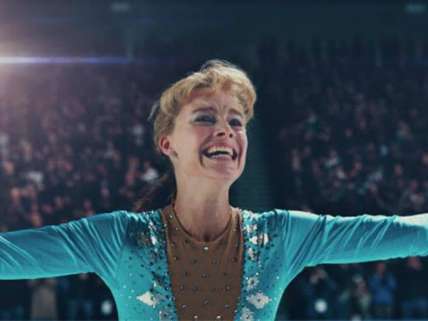Movie Review: I, Tonya
Margot Robbie brings a classic tabloid tale back to life.

In March of 1994, Tonya Harding, a U.S. figure skating star whose career was in decline, pleaded guilty to being part of a conspiracy to attack and disable her rival, Nancy Kerrigan. I, Tonya, an uneven biopic in which Margot Robbie gives a performance of gritty commitment as Harding, relates this classic tabloid story in ways that are both violent and funny, and, in the end, surprisingly moving.
The picture begins in the 1970s in Portland, Oregon, where we see Tonya as a little girl, learning and loving to skate but also being brutally abused by her divorcée mother, LaVona (Alison Janney), who beats her with a hairbrush and berates her mercilessly. By the mid-'80s, Harding(now played by Robbie) is a high-school dropout who has taken up with a rudderless young man named Jeff Gillooly (Sebastian Stan), who carries on LaVona's regimen of beatings and degradation after he and Tonya marry. (Mom tells her daughter, "You're a dumb piece of shit who deserves to be hit.")
Meanwhile, on the pro-skating circuit, Harding is incessantly ridiculed for her cheesy homemade outfits and general wrong-side-of-the-tracks demeanor. But she keeps competing in pursuit of her main goal: to execute a triple axel—a difficult twirling leap—in a championship event. She succeeds in 1991—her big breakthrough. But then, three years later, the Kerry attack brings her career to a halt. She's 23 years old, and she never gets a second chance.
As rise-and-fall narratives go, this is a vivid one. The real-life Tonya Harding is remembered today mainly as a personification of lower-class loser-dom. But director Craig Gillespie and writer Steven Rogers are more sympathetic. In their recounting, Tonya was victimized by her on-and-off husband Gillooly and his fat-slob buddy Shawn Eckhardt (Paul Walter Hauser), who was employed as Tonya's bodyguard. Eckhardt, a delusional figure who still lived with his parents and portrayed himself as some sort of undercover espionage operative, had the idea to start sending death-threat letters to Nancy Kerrigan in an attempt to throw her off her game and clear the way for Harding to triumph. According to the movie, Tonya knew about this scheme and went along with it. But then, without telling her, Eckhardt and Gillooly changed the plan, hiring a dim goon named Stant (Ricky Russert) to get close to Kerrigan and break her knee, hopefully putting her out of action for good.
Stant, a moron, blew this assignment, leaving Kerrigan with nothing more serious than a bruised leg, from which she quickly recovered. The feds moved in, and Gillooly quickly rolled over on Eckhardt and Stant and Stant's getaway driver. Tonya had one last moment of glory at the 1994 Winter Olympics in Lillehammer, Norway, but then, back in the States, she got bagged, too.
Tanya's four co-defendants were sentenced to 18 months in prison. She herself, advised by her lawyer to take a plea deal, got three years' probation, but was also banned for life from professional skating, either as a competitor or a trainer. In a teary courtroom scene, we see her breaking down and begging the judge to give her jail time instead. He told her to move along.
Margot Robbie might be the last person you'd ever expect to play Tonya Harding, but her teased hair and clenched jaw are just right for the character, and she slips into Tonya's cheap purple jeans and hand-fashioned rabbit-fur jacket with ease. Janney gives the movie's most powerful performance, but that's a little bit of a problem: her LaVona may be too deeply, unswervingly hateful—really, how many women would pay a male heckler to shout insults at her daughter as she prepares to compete? For that matter, how many directors would herald this evil creature's appearance with Cliff Richard's "Devil Woman" on the soundtrack? (Or salute Tonya's first triple axel with Foreigner's "Feels like the First Time"?) The movie is sometimes eye-pokingly obvious and overdetermined.
But I, Tonya leaves you wondering what Harding's life might have been like if she'd been born into a more welcoming cultural moment. If she'd had someone to instruct her how to talk and dress and act in the ways that young women were expected to in her time. Tanya always felt that competition judges gave her lower skating scores than she deserved, and one judge finally told her she was right: "It's always about more than skating," he said—she was also expected to represent an American ideal of well-bred feminine agreeability. That was never in the cards, though.
"I was loved for a minute, then I was hated," she says toward the end of the movie. "Then I was a punchline."


Show Comments (19)